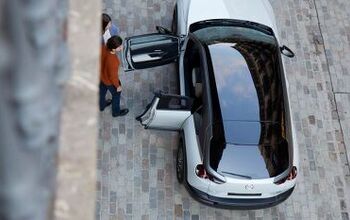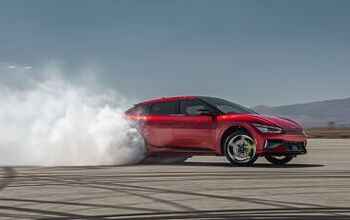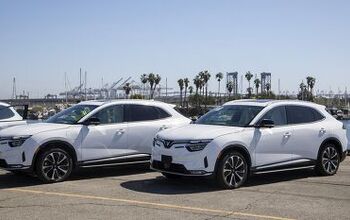Mazda Rotary Engine Returning on MX-30

After years of speculation that Mazda would someday bring back rotary-powered performance, the company is finally willing to confirm that our collective hope was not in vain. However, there will be no rear-drive RX model spinning up its triangular Wankel beyond 8,000 rpm because piston-free rotary engines are difficult to seal. Despite making oodles of power for their size, they’re not well optimized for everyday driving and tend to offer the kind of fuel economy and emissions that get regulators’ panties in a twist.
Given the circumstances, Mazda’s rotary will be returning as a range extender for the MX-30 PHEV.
According to Automotive News, the manufacturer has confirmed that the rotary assisted crossover will be making its way to North America sometime next year. This meshes well with months of rumors and makes sense considering the rather severe range limitations of the all-electric model. The Mazda MX-30 EV’s 35.5-kilowatt-hour battery is limited to just 100 miles of EPA-estimated range. However, we’ve seen tests showing the figure is likely only to be reached under the most idyllic of conditions, limiting its appeal.
Adding a range extender allows Mazda to field the plug-in MX-30 in parts of the United States that aren’t California and forgoes the need to toss in a significantly larger (and heavier) battery pack. It’s basically the company’s only option if it’s serious about sales volume in North America and hardly front-page news considering Mazda had been discussing its development for years.
From Automotive News:
Talk of deploying an updated rotary in the MX-30 has swirled since the vehicle debuted at the 2019 Tokyo Motor Show. Mazda Motor Corp. toyed with using it in a range extender that would have gone on sale in the first half of the fiscal year started April 1.
But Mazda opted for a plug-in variant. That allows it to further reduce the size and cost of the battery, compared with a range extender. But the engine would operate more frequently.
The rotary plug-in version of the MX-30 will debut in the second half of the current fiscal year ending March 31, 2023. It will be introduced in the U.S. and Japan in sequence, a spokesman said.
Having discontinued rotary engines in 2012 with the death of the RX-8, Mazda revived the technology the following year as a 0.33-liter prototype range extender fitted to a Mazda2 that had been converted to an all-electric powertrain. If you’re wondering why a company would go this route to boost efficiency when Wankel rotary engines are famous for being so thirsty and dirty, you’re not alone. However, Mazda had previously suggested that using one as a generator would allow it to run at its most optimal speed by avoiding low RPMs. Rotaries also don’t tend to produce much vibration, potentially making Mazda’s range extender less noticeable than generators using a traditional piston arrangement.
They likewise offer excellent power for their size. Speaking with suppliers, Nikkei Asia said the unit could effectively double the electrified MX-30’s range. But that remains to be seen and we’ve watched other generator-supported EVs flop.
“This is the most Mazda-like initiative in their electrification strategies, and the market is looking at how it will contribute to the sales volume,” said analyst Eiji Hakomori of Daiwa Securities.
Even if this ends up becoming a failure for Mazda, it’s nice to see them trying something unique while figuring out a way to keep the rotary motor relevant. We should have an idea of pricing later this year. Though, if history is anything to go by, EVs equipped with a range extender typically retail for a few grand more than their non-hybrid equivalent.
[Images: Mazda]

A staunch consumer advocate tracking industry trends and regulation. Before joining TTAC, Matt spent a decade working for marketing and research firms based in NYC. Clients included several of the world’s largest automakers, global tire brands, and aftermarket part suppliers. Dissatisfied with the corporate world and resentful of having to wear suits everyday, he pivoted to writing about cars. Since then, that man has become an ardent supporter of the right-to-repair movement, been interviewed on the auto industry by national radio broadcasts, driven more rental cars than anyone ever should, participated in amateur rallying events, and received the requisite minimum training as sanctioned by the SCCA. Handy with a wrench, Matt grew up surrounded by Detroit auto workers and managed to get a pizza delivery job before he was legally eligible. He later found himself driving box trucks through Manhattan, guaranteeing future sympathy for actual truckers. He continues to conduct research pertaining to the automotive sector as an independent contractor and has since moved back to his native Michigan, closer to where the cars are born. A contrarian, Matt claims to prefer understeer — stating that front and all-wheel drive vehicles cater best to his driving style.
More by Matt Posky
Latest Car Reviews
Read moreLatest Product Reviews
Read moreRecent Comments
- Varezhka I have still yet to see a Malibu on the road that didn't have a rental sticker. So yeah, GM probably lost money on every one they sold but kept it to boost their CAFE numbers.I'm personally happy that I no longer have to dread being "upgraded" to a Maxima or a Malibu anymore. And thankfully Altima is also on its way out.
- Tassos Under incompetent, affirmative action hire Mary Barra, GM has been shooting itself in the foot on a daily basis.Whether the Malibu cancellation has been one of these shootings is NOT obvious at all.GM should be run as a PROFITABLE BUSINESS and NOT as an outfit that satisfies everybody and his mother in law's pet preferences.IF the Malibu was UNPROFITABLE, it SHOULD be canceled.More generally, if its SEGMENT is Unprofitable, and HALF the makers cancel their midsize sedans, not only will it lead to the SURVIVAL OF THE FITTEST ones, but the survivors will obviously be more profitable if the LOSERS were kept being produced and the SMALL PIE of midsize sedans would yield slim pickings for every participant.SO NO, I APPROVE of the demise of the unprofitable Malibu, and hope Nissan does the same to the Altima, Hyundai with the SOnata, Mazda with the Mazda 6, and as many others as it takes to make the REMAINING players, like the Excellent, sporty Accord and the Bulletproof Reliable, cheap to maintain CAMRY, more profitable and affordable.
- GregLocock Car companies can only really sell cars that people who are new car buyers will pay a profitable price for. As it turns out fewer and fewer new car buyers want sedans. Large sedans can be nice to drive, certainly, but the number of new car buyers (the only ones that matter in this discussion) are prepared to sacrifice steering and handling for more obvious things like passenger and cargo space, or even some attempt at off roading. We know US new car buyers don't really care about handling because they fell for FWD in large cars.
- Slavuta Why is everybody sweating? Like sedans? - go buy one. Better - 2. Let CRV/RAV rust on the dealer lot. I have 3 sedans on the driveway. My neighbor - 2. Neighbors on each of our other side - 8 SUVs.
- Theflyersfan With sedans, especially, I wonder how many of those sales are to rental fleets. With the exception of the Civic and Accord, there are still rows of sedans mixed in with the RAV4s at every airport rental lot. I doubt the breakdown in sales is publicly published, so who knows... GM isn't out of the sedan business - Cadillac exists and I can't believe I'm typing this but they are actually decent - and I think they are making a huge mistake, especially if there's an extended oil price hike (cough...Iran...cough) and people want smaller and hybrids. But if one is only tied to the quarterly shareholder reports and not trends and the big picture, bad decisions like this get made.



































Comments
Join the conversation
Might as well install a steam engine range extender
Hyundai 8-speed DCT not smooth? I own one and it is snappy and smooth I love this trans.